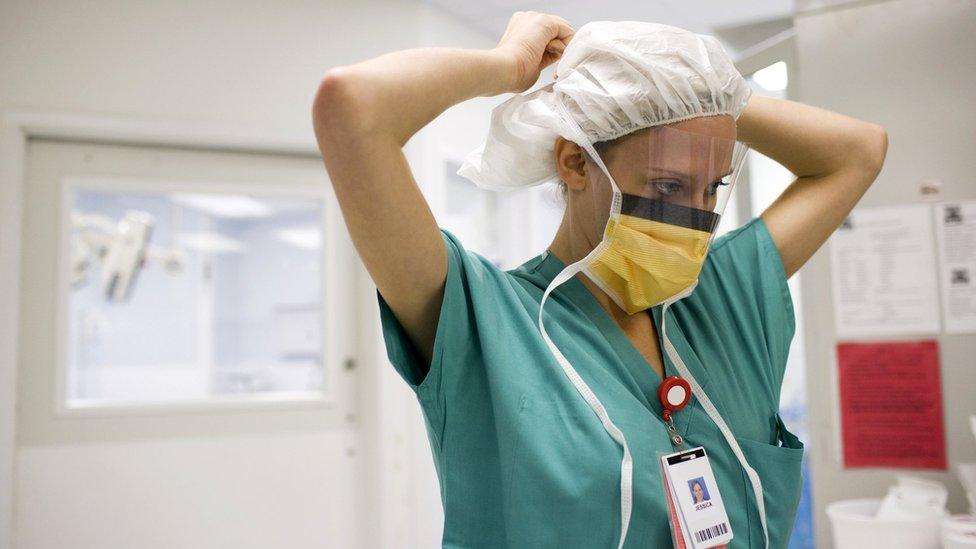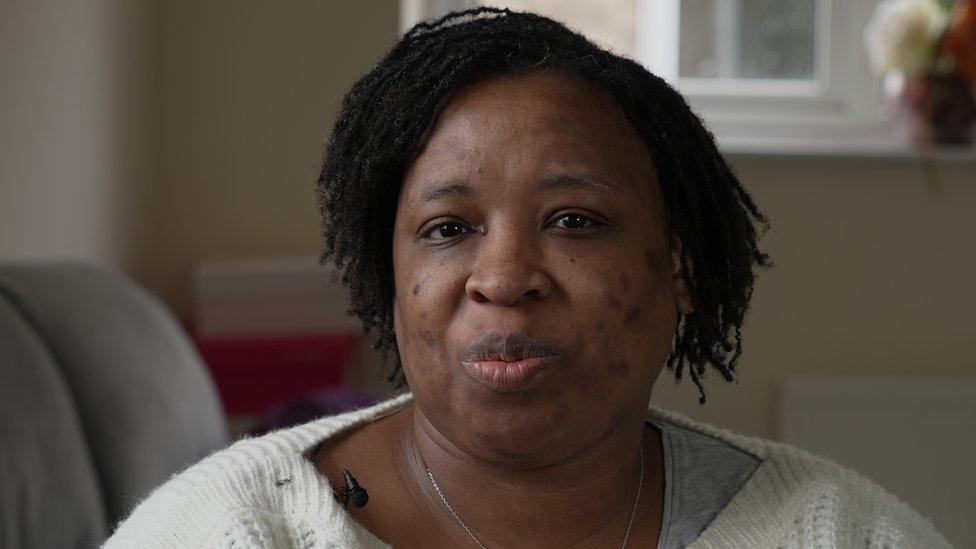Cost of living: 'My pay isn't keeping up with rising prices'
- Published

UK wage growth failed to keep up with the rising cost of living between November and January, new figures show.
Wages rose, but when taking rising prices into account, regular pay showed a 1% fall from a year earlier, the Office for National Statistics said.
Gamu Nyasoro, a senior registered nurse, told the BBC that despite a recent pay rise, she has barely noticed a difference in her income after bills.
There is concern the Ukraine war will further push up energy and food bills.
The new employment figures also show that the number of jobless people in the UK has dropped below pre-pandemic levels.
The ONS said there were 1.34 million unemployed in the three months to January, below the 1.36 million recorded in December to February 2020.
The unemployment rate fell to 3.9% in the most recent quarter, while job vacancies hit another record high.
But according to the ONS, external, employees' regular pay, excluding bonuses, grew by 3.8% between November and January from a year earlier.
However, the rising cost of food, energy and household goods has pushed inflation, which measures how the cost of living changes over time, to a 30-year high. Prices surged by 5.5% in the 12 months to January, up from 5.4% in December, increasing pressure on household budgets.
The Resolution Foundation think tank has warned that the squeeze on workers will get worse, with those on the lowest incomes most likely to be affected by surging bills.
The ONS said its latest figures showed the number of unemployed people fell below pre-pandemic levels for the first time, while there was another strong rise in the number of pay-rolled employees in February.
Grant Fitzner, chief economist at the ONS, added: "However, the number of people out of work and not looking for a job rose again, meaning total employment remained well below its pre-pandemic level.
"We have seen yet another record number of job vacancies, and with the redundancy rate falling to a new record low, demand for workers remains strong."
The ONS said early estimates for February 2022 indicated that median monthly pay was £2,041, an increase of 5.1% compared with the same period last year.
"The issue is not that pay growth is weak, it's that prices are running even higher," Mr Fitzner told the BBC's Today programme.
Recent research by the Institute for Fiscal Studies suggested that public sector workers in particular are facing pay cuts once rising prices are taken into account.
'Left with no money after bills'

Gamu Nyasoro is a medical educator with the NHS
Gamu Nyasoro, says her pay rise is barely noticeable once increasing council tax, energy and food bills are taken into account.
As a single mother to three children, a lot of her outgoings are spent on childcare.
"I look at my pay cheque and you literally want to cry because you know that by day two, the things that you need to pay have gone out and you are literally left with no money."
She says finances are now a constant worry. Her forecast energy bill for the next year has nearly doubled.
She was recently also forced to use a foodbank for the first time. "It was one of the most scariest thing that I've done and something that I didn't do lightly."


You can't sugar-coat this. It's been widely predicted that living standards would fall as a result of rising inflation. Before inflation, the average pay rise was 3.8% excluding bonuses - substantially more than most workers have been used to over the past decade.
However, because prices are now rising faster than that, the average wage (now £555 per week) can buy fewer goods and services than a year ago. After allowing for inflation, it amounts to a real terms pay cut of 1% across the board.
That average hides a growing gap between the private sector, where bonuses have lifted total pay by 5.3% including bonuses, enough to keep up with the rising cost of living, and the public sector, where total pay rose by only 2.4% and living standards are falling more sharply.
We've only just got over the worst decade for improvements in living standards in 200 years. Now, once again, living standards for most workers are falling. And that's before what's anticipated in the coming weeks - a rise in interest rates, rising energy bills and higher taxes.

Ben Harrison, director of the Work Foundation, said: "Rising prices and the energy cap increase in April will affect all households across the UK, but it will acutely impact those in low paying and insecure employment."
He called on the chancellor to use the Spring Statement on 23 March to support those most at risk by, for example, increasing Universal Credit payments.
The British Chamber of Commerce suggested that Rishi Sunak should use the Spring Statement to delay a planned rise in National Insurance contributions by one year, to give firms a bit of financial headroom in the face of rising costs.
Responding to the new figures, Chancellor Rishi Sunak said: "I am confident that our labour market is in a good position to deal with the current global challenges.
"We know people are concerned about the rising cost of living so alongside continuing to help people find great jobs - we're providing direct support worth more than £20bn this financial year and next."
Bank of England boss: 'Don’t ask for a big pay rise'
Other experts also suggested that action was needed to help older people in particular.
Separate research published by the ONS shows that a significant number of older workers have dropped out of the workforce for a mix of reasons, such as long-term sickness or those taking early retirement.
However, some analysts said the strength in the labour market overall meant the Bank of England was likely to increase interest rates on Thursday.
Martin Beck of the EY Item Club said the Bank might be worried that a tight jobs market could see workers asking for higher wages to off-set budget pressures.
Earlier this year, the Bank's governor came under fire for suggesting that workers should not ask for big pay rises, to try to stop prices rising out of control.
- Published10 March 2022

- Published4 February 2022

